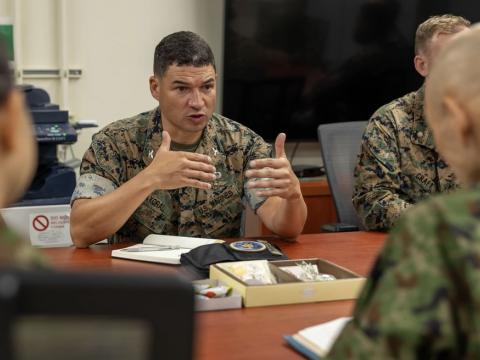Countering Adversarial Threats and Protecting the Homeland Through Cyber Policy
The Office of the Undersecretary of Defense for Policy, which in 2024 formally established the position of the assistant secretary of defense (ASD) for cyber policy, plays a vital role in empowering United States’ digital guardians. So said Ashley Manning, principal deputy assistant secretary of defense for cyber policy, during her keynote address at TechNet Cyber in Baltimore, Maryland.
“Our organization acts as a critical bridge between the secretary’s strategy roles and the warfighters who execute them,” she told the audience.
The office, she stated, takes the “what” of overall strategic objectives and helps translate that into the “how,” in terms of plans, programs and policies required to help the military meet its objectives. “We ensure that our policies are aligned with the broader national security strategy set by the president,” Manning continued.
“In a rapidly changing world, our policies must be adaptable, as well,” she emphasized.
Manning also spoke specifically on cybersecurity, outlining key priorities her team is currently addressing. Securing the homeland and enabling the warfighters are the dual pillars of the U.S. National Security Strategy, she said.
“In addition to … countering our adversaries abroad, the defense of our homeland is our paramount responsibility,” Manning highlighted.
From protecting critical infrastructure to countering cartels, the mission encompasses a range of crucial activities.
“As the lead for DOD cyberspace policy and strategy, we establish and oversee the implementation of cyberspace policy, integrating a national cyberspace guidance with DOD-specific requirements,” she stated. “Transnational criminal organizations increasingly use cyberspace to facilitate their illicit activities, including drug trafficking, human smuggling and money laundering. We are actively working to disrupt these overseas networks, intercept their communications and dismantle their digital infrastructure. By denying the safe haven in the digital realm, we can significantly degrade their ability to operate, and undermine those criminal enterprises.”
The office of the ASD for cyber policy provides critical guidance and oversight on all DOD cyberspace activities, Manning added, “specifically those related to foreign cyber threats, international cooperation and engagements with foreign partners and international organizations.”
Our organization acts as a critical bridge between the secretary’s strategy roles and the warfighters who execute them.
The ASD for cyber policy also serves as the principal cyber advisor to the secretary of defense, Manning shared.
Of note, just yesterday retired U.S. Army colonel Laurie Buckhout was sworn in to be performing the duties of ASD for cyber policy. In a recent conversation with SIGNAL Media, Buckhout spoke on her confidence in the military’s cyber workforce and her faith in future digital warfighters.
Prior to her new role, Buckhout was appointed as the deputy assistant secretary of defense for cyber policy in March.
In her closing comments, Manning offered a call to action.
“We must innovate by investing in cutting-edge technologies and creating a culture of creativity within our cyber forces,” she said. “We must integrate our cyber capabilities seamlessly across all the needs, ensuring that we are fully synchronized with our broader military strategy. And we must dominate the cyber domain, establishing a position of strength that deters our adversaries and protects our interests.”





Comments